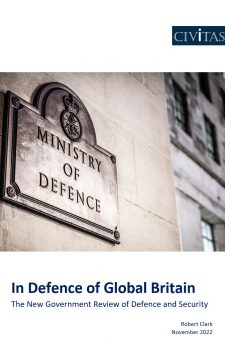In Defence of Global Britain: The New Government Review of Defence and Security
Robert Clark, November 2022
Former British Prime Minister Liz Truss announced plans to launch a new defence and foreign policy review, whilst in New York to address the United Nations General Assembly in late September. The new British government under Prime Minster Rishi Sunak has confirmed that this new ‘review of the review’ will still take place. The overarching theme reflects the growing awareness in British government that the global order is under many threats from authoritarian regimes – specifically, China and Russia.
These threats come in various forms, but can be broadly divided into military, economic, societal, and diplomatic. ‘In Defence of Global Britain’ written by Robert Clark, director of the Defence and Security Unit (DSU) at Civitas who sets out the challenges facing the UK and our armed forces.
This publication argues for an increase in UK defence spending in light of threats from Russia and China. The author, Robert Clark argues that a reverse to the cuts announced last year to British Army personnel, tanks, and Royal Navy Frigates must be a minimum contribution in order to meet current threats, whilst spending should be raised gradually over the next eight years or the UK risks missing its NATO mandated 2 per cent of GDP benchmark for defence spending.
Given the rising threat levels and increased commitments placed upon the Armed Forces, maintaining defence spending at present depreciating rates – let alone any potential future cuts – will be nothing short of disastrous for the UK’s national security. This would subsequently severely undermine 2021’s Integrated Review – which has largely stood the test of this year’s turbulent geopolitical events in eastern Europe and the Taiwan Strait.
Robert Clark argues that this does not have to be at the expense of much higher taxes, or even further cuts to other departments. Instead, he argues that we should reverse recently announced cuts to personnel, armour, and vessels. Military headcount should be steadily increased to at least 2010 levels when the military was less globally deployed than it is now.
A troop increase back to 2010 levels of around 100,000 trained Army personnel would enable both the current global deployments, in addition to the persistent presence envisaged to the Indo-Pacific, whilst maintaining multiple overseas training missions – all military activities previously unseen during higher force levels 20 years ago – whilst maintaining a credible conventional land and sea deterrent in Europe, and a supporting role in Asia too.
This would be the most ‘prudent’ defence strategy given the UK government’s desire (and indeed, geopolitical necessity) to contain authoritarianism in Europe and Asia, working alongside crucial like-minded allies and partners.
Download PDF
